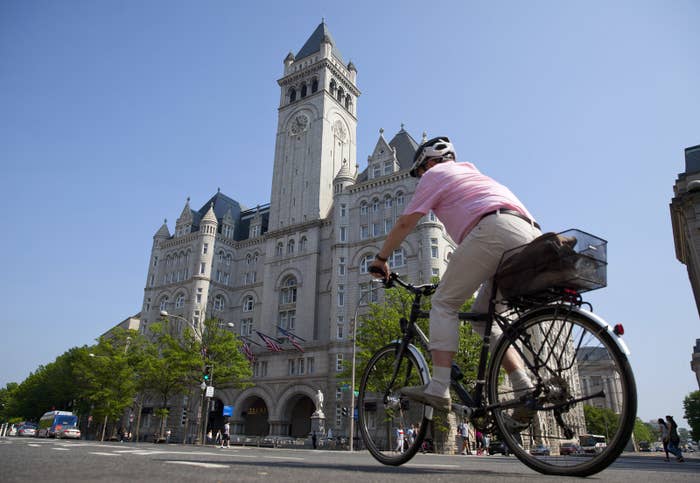
When the staffs of the New York Times and Washington Post won a Pulitzer Prize last month for their reporting on the Trump campaign’s alleged Russia ties, there was one striking detail about the winning articles: how few of the reporters involved were Russia correspondents. Almost all the pieces were written by reporters in New York City and Washington, DC, with the occasional additional reporting credit from Moscow.
This might seem surprising, but it shouldn’t, because Russiagate isn’t really a story about Russia. The perception that it is fuels public misunderstanding and furthers an unhelpful narrative in which Russia is held responsible for America’s deep-seated domestic political problems. That narrative, regardless of whether one embraces it (think Rachel Maddow) or rejects it (think Glenn Greenwald), misses the point of what the careful, sober, primarily US-based reporting on Russiagate actually tells us about the biggest political scandal in recent history.
In July 2017, Joshua Yaffa reported from Moscow for the New Yorker on what reputable Russian journalists made of the Trump-Russia story. “I spoke to more than a half-dozen of them, all of whom found themselves in some way bemused, frustrated, or disappointed in the way that the US press has covered Putin and Russia,” Yaffa wrote. The interviewees accused the US media, not inaccurately, of fomenting conspiracy theories, exaggerating Vladimir Putin’s degree of control over the Russian state, jumping to conclusions about the identity and motivations of Russian hackers, and other journalistic failures. But conspicuously, none of them seemed to have much to say about the scandal itself.
And why would they? The truth is that most of what Russiagate entails took place in the United States, and most of the important characters in the story are American. What the Mueller investigation continually reveals is the extent of everyday corruption in US business and politics — corruption that often connects to Russian actors but is also distinctly American in origin.
Consider the recent reporting on Michael Cohen’s shady business dealings. On the one hand, this is clearly a Russiagate story — while serving as Trump’s personal lawyer and fixer, Cohen appears to have maintained associations with Russian mobsters, and he is now a subject of Robert Mueller’s investigation. On the other hand, like many other Russiagate stories, this one takes place mainly in New York City, where it was reported, and it concerns taxi medallions and real estate deals that are far removed from allegations of direct collusion between the Trump campaign and Russian intelligence.
None of this has stopped mainstream media outlets from encouraging panic about Russia, often with a xenophobic undertone. But while hyperbolic words and foreboding images of Putin’s face, Soviet flags, and St. Basil’s Cathedral may dominate cable news and magazine covers, diligent reporters based mainly in the US have been doing the real work to expose a complex political corruption scandal in which, while Russian intelligence clearly played a significant role, the prime culprits are almost all Americans. Skepticism of Russiagate has abated as new details emerge almost daily, most of which are deeply informed by sources within the US.
To be sure, for years reporters in Russia have risked their lives and freedom to document what is happening there — how a network of oligarchs, mobsters, and state institutions have worked to spread disinformation across the world and to wage war against and otherwise destabilize Russia’s neighbors. Russia and the US have both experienced skyrocketing inequality and elite corruption over the past several decades, and as I’ve argued elsewhere, these shared experiences indicate fatal weaknesses in the global economic order the US has long championed. In due course, we will gain a fuller understanding of how the Russian and American stories intersected in 2016. But getting there will require reexamining what American elites have been permitted to get away with.
Russiagate fills Americans with anxiety because it undermines a widely held core faith that the US is a sovereign superpower and a functioning democracy. The events of 2016, however, suggest we’re not so different from the dozens of countries around the world in which US intelligence has covertly supported one political faction over another, often with devastating results.
It wasn’t really news that Russian agents operate within the US and try to establish links with wealthy and influential Americans, nor that Russian hackers routinely make mischief on social media networks. The real news was that these tactics might have swayed a presidential election. But they certainly did not create the political system in which an unqualified ignoramus like Trump, surrounded by an entourage of amoral mediocrities, could rise to the head of the Republican Party, and from there to the White House. Surely Putin was as surprised as anyone else at just how rotten the foundations of US politics had become by 2016.
“For more than six months now, Russia has served as a crutch for the American imagination,” wrote the Russian-American journalist Masha Gessen in March 2017. “It is used to explain how Trump could have happened to us, and it is also called upon to give us hope. When the Russian conspiracy behind Trump is finally fully exposed, our national nightmare will be over.” Gessen was skeptical that Russiagate would amount to anything, and that skepticism doesn’t hold up very well a year later. But her warning about conspiratorial and magical thinking does, and her larger point — that Americans are responsible for the array of institutional failures that led to the Trump presidency — is worth heeding.
Russiagate is fundamentally a story about crimes committed in America by Americans. It will be American journalists who expose most of its details, American officials who must be held responsible, and American voters who will have to make sure that they are.
David Klion has written about Russiagate for the Nation, the New York Times, The Guardian, and other publications. He tweets @DavidKlion.
